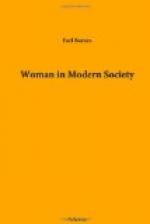Ideals are very powerful in determining conduct, and the ideals of extreme individualism, now so constantly presented by certain leaders among emancipated women, must bear bitter fruit for an army of women in the future. While the women are young, ambition and the charm of freedom bear them gaily along. Generally better educated than the men of their own class, habituated to a personal expenditure which would correspond with a large family expenditure, their intelligence prevents their falling desperately in love with the men whom they might marry. But in the thirties they have visions of the future which are deeply disturbing; and in the forties they face the tragedy of a lonely old age. Some men and women there must always be whose lives lack the fulfilment of family life because of ill health or the accidents of personal relations. But most women, if they are willing to pay the same price for a significant family life that they so gladly pay for professional success, will find the way open to live all of life. Why is it that women count it an honor to work and starve for an art, but dishonor to undergo privations for their children? All that is here said of women may be said of men, but the man’s period of family life is longer than woman’s, and the tragedy of lonely old age with him seems less overwhelming.
The old plea that we must have an army of celibate women because in civilized countries there is a preponderance of females does not hold at present in the United States. The census of 1910 shows an excess of 2,691,678 males in this country. Nor is this entirely due to immigration. More boys than girls are always born in civilized lands; and of native white people born of native parents in the United States there were, in 1910, 25,229,294 males and 24,259,147 females, a difference obviously due to natural causes. New England alone in America has a preponderance of females; and the excess there, as also in England and Germany, is needed all along the frontiers of civilization. With the industrial and social freeing of women now going on, we may reasonably hope that the communities of old maids left behind, through the emigration of young men, will be broken up.
Of course, it will be pointed out that many men and women who do marry fail to realize the ideal presented in these pages. Every form of living is dangerous and not every one can hope to be a successful husband and father or wife and mother. Even devotion to religion furnishes many inmates for insane asylums; athletic contests leave a line of cripples behind them; and railroad disasters fill thousands of graves annually. The institution of marriage has had no such intelligence applied to its improvement during the past years as has been given to perfecting railroads; and since founding a family is a more difficult undertaking than making a journey, one need not be astonished at the number of fatalities. Even if the institution of marriage were as intelligently and carefully brought up to date as railroad systems are, it would still remain dangerous to live either in or out of marriage.




